University Essay: Discipline and Control in the Modern Era (Foucault)
VerifiedAdded on 2023/01/11
|5
|1353
|87
Essay
AI Summary
This essay delves into the concept of discipline and control in the modern era, analyzing the theories of Michel Foucault and Giorgio Agamben. The essay explores how these thinkers examined the mechanisms by which power operates to shape individual behavior and societal structures. It begins by examining Foucault's ideas on power and knowledge, particularly his concept of the Panopticon, which illustrates how surveillance and control are achieved. The essay then moves on to Agamben's work, focusing on his concept of biopolitics and thanato politics, and how they relate to the control of bodies and minds. By comparing and contrasting the approaches of Foucault and Agamben, the essay aims to provide a comprehensive understanding of how discipline is achieved in the contemporary world. The essay also includes a discussion of how external structures of the society produce subjects which are loyal to them. The conclusion highlights the importance of discipline in modern life and the various structures that contribute to its enforcement.
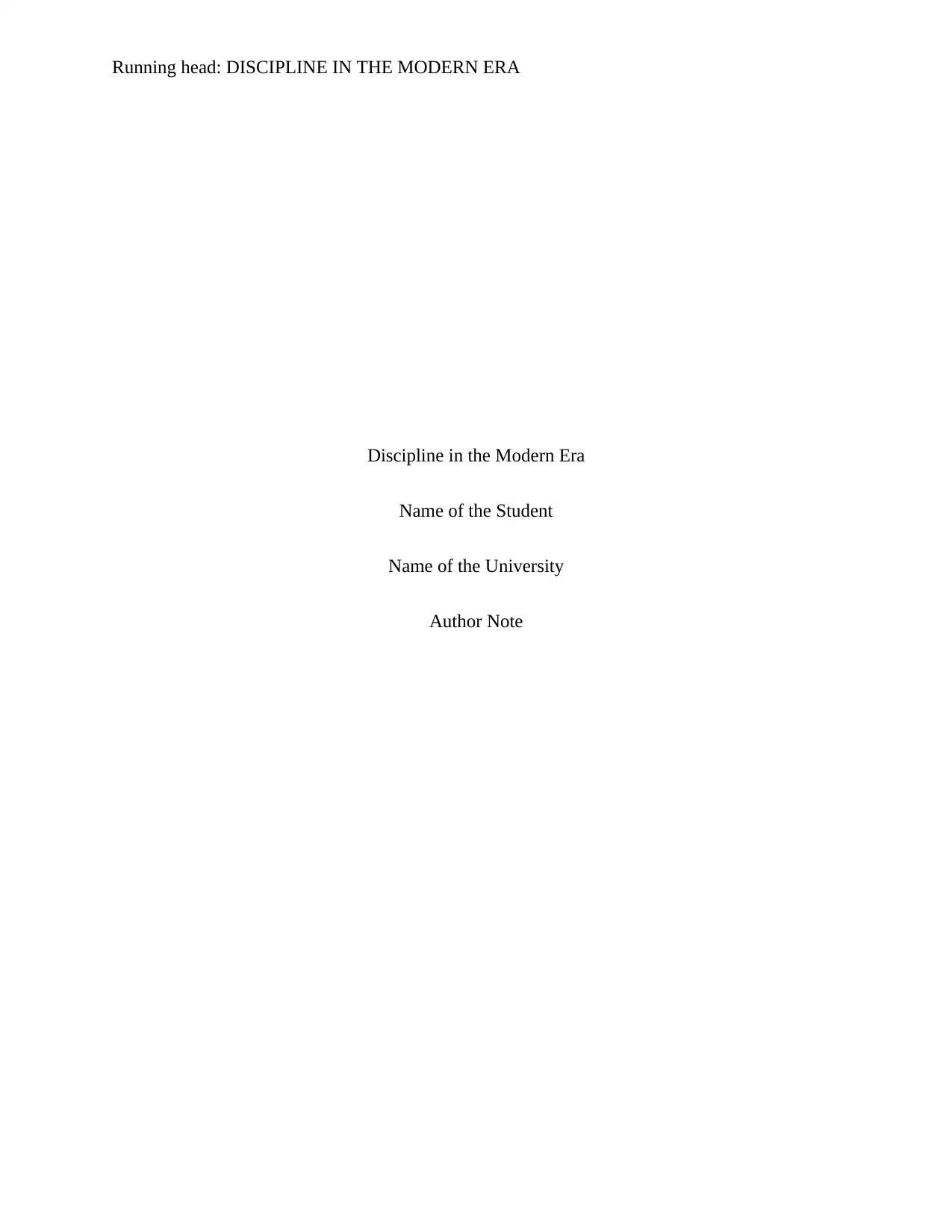
Running head: DISCIPLINE IN THE MODERN ERA
Discipline in the Modern Era
Name of the Student
Name of the University
Author Note
Discipline in the Modern Era
Name of the Student
Name of the University
Author Note
Paraphrase This Document
Need a fresh take? Get an instant paraphrase of this document with our AI Paraphraser
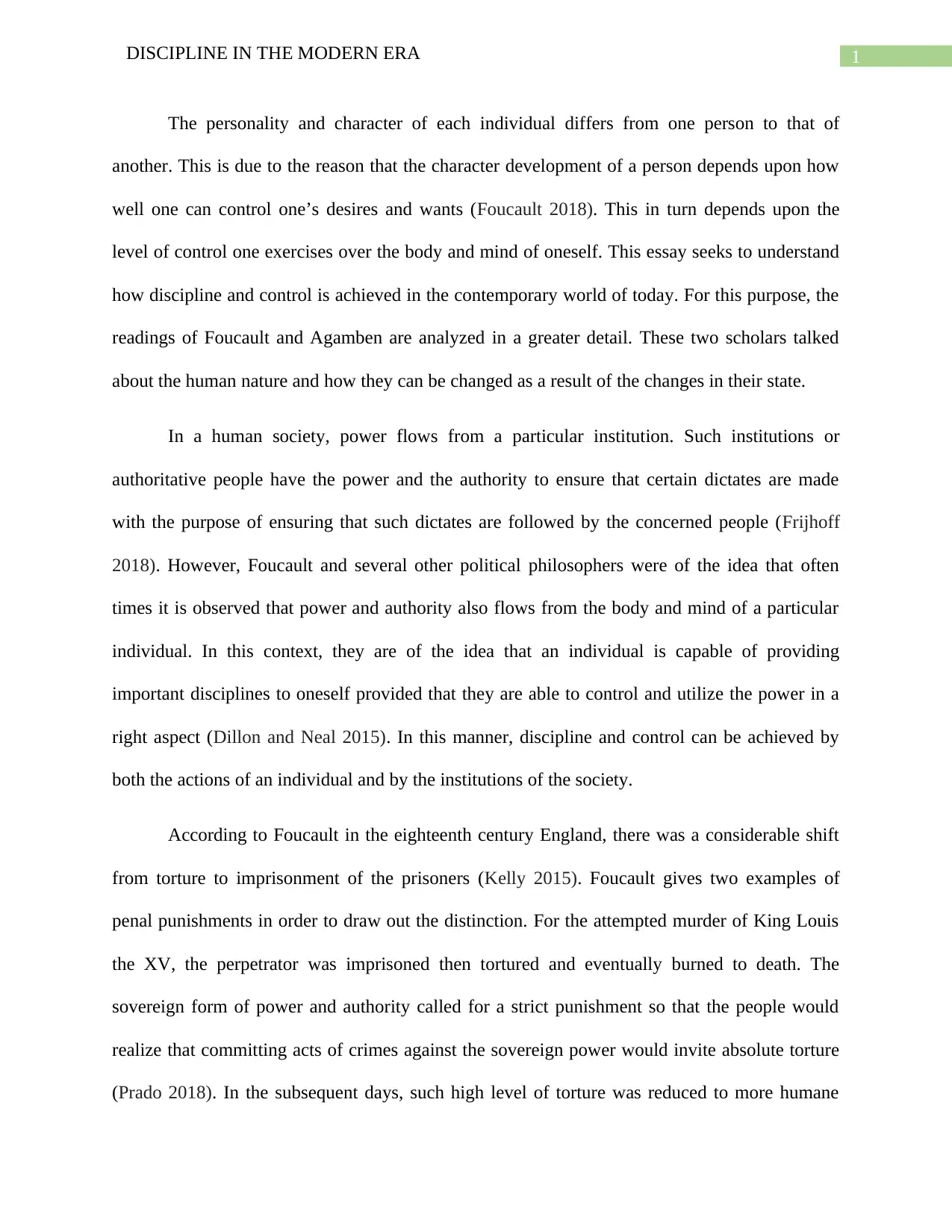
1DISCIPLINE IN THE MODERN ERA
The personality and character of each individual differs from one person to that of
another. This is due to the reason that the character development of a person depends upon how
well one can control one’s desires and wants (Foucault 2018). This in turn depends upon the
level of control one exercises over the body and mind of oneself. This essay seeks to understand
how discipline and control is achieved in the contemporary world of today. For this purpose, the
readings of Foucault and Agamben are analyzed in a greater detail. These two scholars talked
about the human nature and how they can be changed as a result of the changes in their state.
In a human society, power flows from a particular institution. Such institutions or
authoritative people have the power and the authority to ensure that certain dictates are made
with the purpose of ensuring that such dictates are followed by the concerned people (Frijhoff
2018). However, Foucault and several other political philosophers were of the idea that often
times it is observed that power and authority also flows from the body and mind of a particular
individual. In this context, they are of the idea that an individual is capable of providing
important disciplines to oneself provided that they are able to control and utilize the power in a
right aspect (Dillon and Neal 2015). In this manner, discipline and control can be achieved by
both the actions of an individual and by the institutions of the society.
According to Foucault in the eighteenth century England, there was a considerable shift
from torture to imprisonment of the prisoners (Kelly 2015). Foucault gives two examples of
penal punishments in order to draw out the distinction. For the attempted murder of King Louis
the XV, the perpetrator was imprisoned then tortured and eventually burned to death. The
sovereign form of power and authority called for a strict punishment so that the people would
realize that committing acts of crimes against the sovereign power would invite absolute torture
(Prado 2018). In the subsequent days, such high level of torture was reduced to more humane
The personality and character of each individual differs from one person to that of
another. This is due to the reason that the character development of a person depends upon how
well one can control one’s desires and wants (Foucault 2018). This in turn depends upon the
level of control one exercises over the body and mind of oneself. This essay seeks to understand
how discipline and control is achieved in the contemporary world of today. For this purpose, the
readings of Foucault and Agamben are analyzed in a greater detail. These two scholars talked
about the human nature and how they can be changed as a result of the changes in their state.
In a human society, power flows from a particular institution. Such institutions or
authoritative people have the power and the authority to ensure that certain dictates are made
with the purpose of ensuring that such dictates are followed by the concerned people (Frijhoff
2018). However, Foucault and several other political philosophers were of the idea that often
times it is observed that power and authority also flows from the body and mind of a particular
individual. In this context, they are of the idea that an individual is capable of providing
important disciplines to oneself provided that they are able to control and utilize the power in a
right aspect (Dillon and Neal 2015). In this manner, discipline and control can be achieved by
both the actions of an individual and by the institutions of the society.
According to Foucault in the eighteenth century England, there was a considerable shift
from torture to imprisonment of the prisoners (Kelly 2015). Foucault gives two examples of
penal punishments in order to draw out the distinction. For the attempted murder of King Louis
the XV, the perpetrator was imprisoned then tortured and eventually burned to death. The
sovereign form of power and authority called for a strict punishment so that the people would
realize that committing acts of crimes against the sovereign power would invite absolute torture
(Prado 2018). In the subsequent days, such high level of torture was reduced to more humane
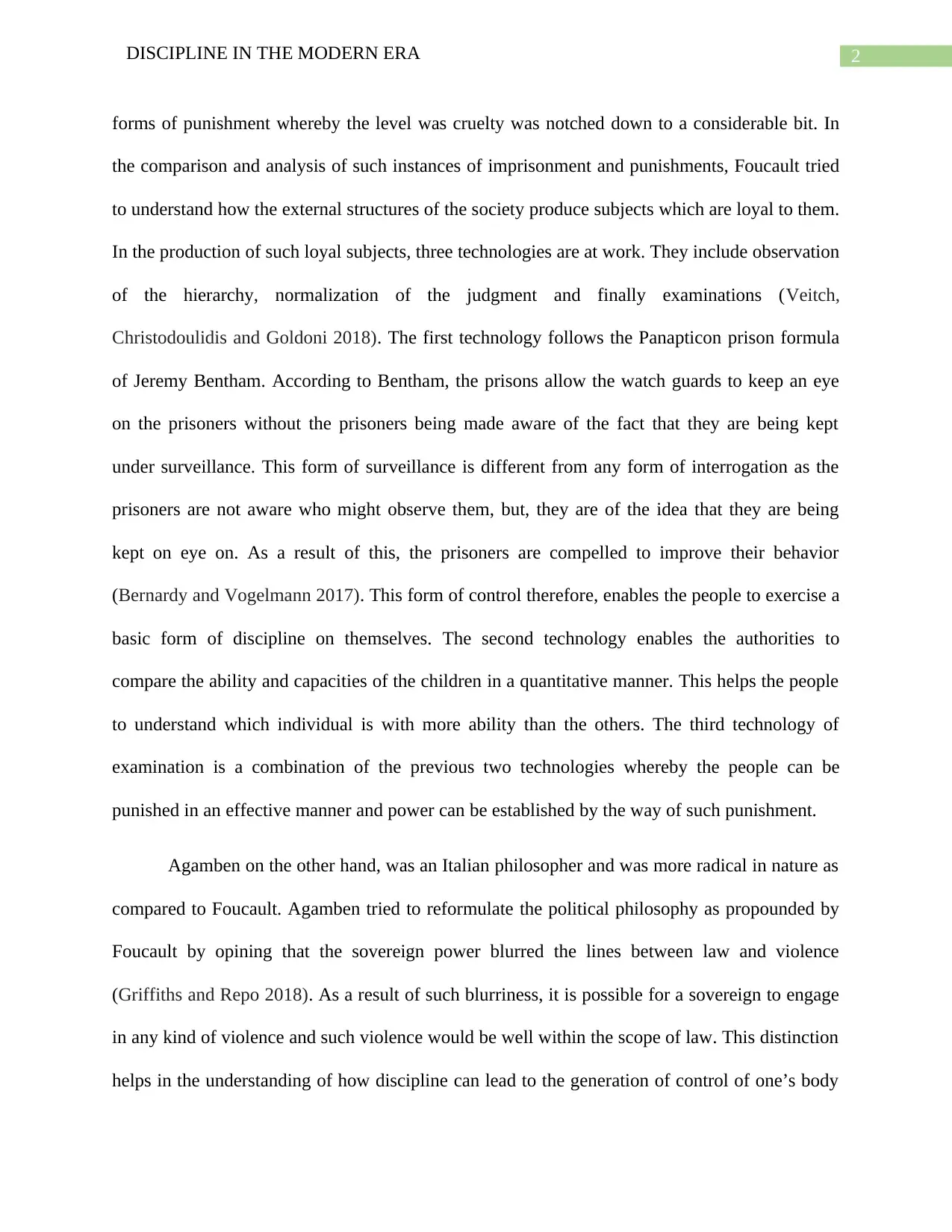
2DISCIPLINE IN THE MODERN ERA
forms of punishment whereby the level was cruelty was notched down to a considerable bit. In
the comparison and analysis of such instances of imprisonment and punishments, Foucault tried
to understand how the external structures of the society produce subjects which are loyal to them.
In the production of such loyal subjects, three technologies are at work. They include observation
of the hierarchy, normalization of the judgment and finally examinations (Veitch,
Christodoulidis and Goldoni 2018). The first technology follows the Panapticon prison formula
of Jeremy Bentham. According to Bentham, the prisons allow the watch guards to keep an eye
on the prisoners without the prisoners being made aware of the fact that they are being kept
under surveillance. This form of surveillance is different from any form of interrogation as the
prisoners are not aware who might observe them, but, they are of the idea that they are being
kept on eye on. As a result of this, the prisoners are compelled to improve their behavior
(Bernardy and Vogelmann 2017). This form of control therefore, enables the people to exercise a
basic form of discipline on themselves. The second technology enables the authorities to
compare the ability and capacities of the children in a quantitative manner. This helps the people
to understand which individual is with more ability than the others. The third technology of
examination is a combination of the previous two technologies whereby the people can be
punished in an effective manner and power can be established by the way of such punishment.
Agamben on the other hand, was an Italian philosopher and was more radical in nature as
compared to Foucault. Agamben tried to reformulate the political philosophy as propounded by
Foucault by opining that the sovereign power blurred the lines between law and violence
(Griffiths and Repo 2018). As a result of such blurriness, it is possible for a sovereign to engage
in any kind of violence and such violence would be well within the scope of law. This distinction
helps in the understanding of how discipline can lead to the generation of control of one’s body
forms of punishment whereby the level was cruelty was notched down to a considerable bit. In
the comparison and analysis of such instances of imprisonment and punishments, Foucault tried
to understand how the external structures of the society produce subjects which are loyal to them.
In the production of such loyal subjects, three technologies are at work. They include observation
of the hierarchy, normalization of the judgment and finally examinations (Veitch,
Christodoulidis and Goldoni 2018). The first technology follows the Panapticon prison formula
of Jeremy Bentham. According to Bentham, the prisons allow the watch guards to keep an eye
on the prisoners without the prisoners being made aware of the fact that they are being kept
under surveillance. This form of surveillance is different from any form of interrogation as the
prisoners are not aware who might observe them, but, they are of the idea that they are being
kept on eye on. As a result of this, the prisoners are compelled to improve their behavior
(Bernardy and Vogelmann 2017). This form of control therefore, enables the people to exercise a
basic form of discipline on themselves. The second technology enables the authorities to
compare the ability and capacities of the children in a quantitative manner. This helps the people
to understand which individual is with more ability than the others. The third technology of
examination is a combination of the previous two technologies whereby the people can be
punished in an effective manner and power can be established by the way of such punishment.
Agamben on the other hand, was an Italian philosopher and was more radical in nature as
compared to Foucault. Agamben tried to reformulate the political philosophy as propounded by
Foucault by opining that the sovereign power blurred the lines between law and violence
(Griffiths and Repo 2018). As a result of such blurriness, it is possible for a sovereign to engage
in any kind of violence and such violence would be well within the scope of law. This distinction
helps in the understanding of how discipline can lead to the generation of control of one’s body
⊘ This is a preview!⊘
Do you want full access?
Subscribe today to unlock all pages.

Trusted by 1+ million students worldwide
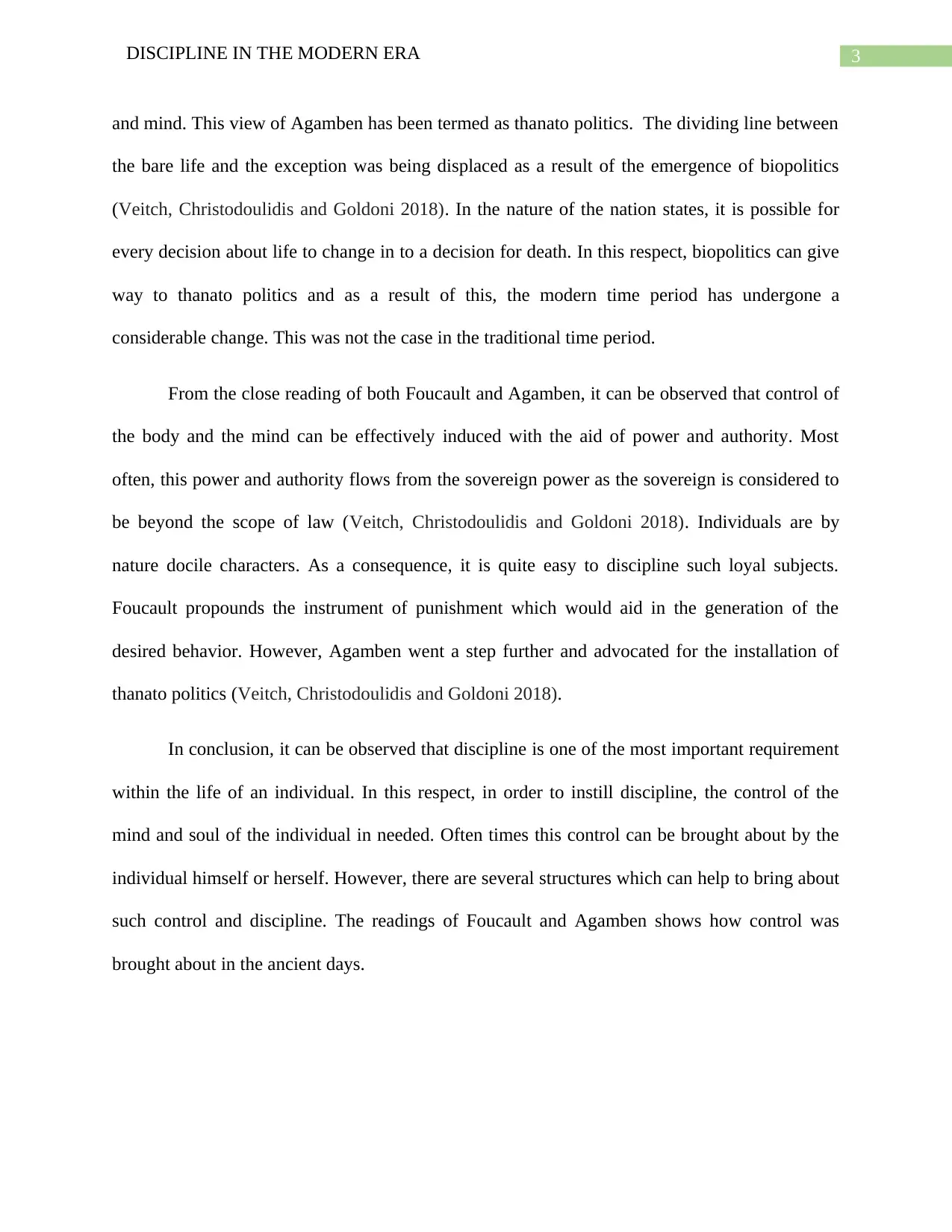
3DISCIPLINE IN THE MODERN ERA
and mind. This view of Agamben has been termed as thanato politics. The dividing line between
the bare life and the exception was being displaced as a result of the emergence of biopolitics
(Veitch, Christodoulidis and Goldoni 2018). In the nature of the nation states, it is possible for
every decision about life to change in to a decision for death. In this respect, biopolitics can give
way to thanato politics and as a result of this, the modern time period has undergone a
considerable change. This was not the case in the traditional time period.
From the close reading of both Foucault and Agamben, it can be observed that control of
the body and the mind can be effectively induced with the aid of power and authority. Most
often, this power and authority flows from the sovereign power as the sovereign is considered to
be beyond the scope of law (Veitch, Christodoulidis and Goldoni 2018). Individuals are by
nature docile characters. As a consequence, it is quite easy to discipline such loyal subjects.
Foucault propounds the instrument of punishment which would aid in the generation of the
desired behavior. However, Agamben went a step further and advocated for the installation of
thanato politics (Veitch, Christodoulidis and Goldoni 2018).
In conclusion, it can be observed that discipline is one of the most important requirement
within the life of an individual. In this respect, in order to instill discipline, the control of the
mind and soul of the individual in needed. Often times this control can be brought about by the
individual himself or herself. However, there are several structures which can help to bring about
such control and discipline. The readings of Foucault and Agamben shows how control was
brought about in the ancient days.
and mind. This view of Agamben has been termed as thanato politics. The dividing line between
the bare life and the exception was being displaced as a result of the emergence of biopolitics
(Veitch, Christodoulidis and Goldoni 2018). In the nature of the nation states, it is possible for
every decision about life to change in to a decision for death. In this respect, biopolitics can give
way to thanato politics and as a result of this, the modern time period has undergone a
considerable change. This was not the case in the traditional time period.
From the close reading of both Foucault and Agamben, it can be observed that control of
the body and the mind can be effectively induced with the aid of power and authority. Most
often, this power and authority flows from the sovereign power as the sovereign is considered to
be beyond the scope of law (Veitch, Christodoulidis and Goldoni 2018). Individuals are by
nature docile characters. As a consequence, it is quite easy to discipline such loyal subjects.
Foucault propounds the instrument of punishment which would aid in the generation of the
desired behavior. However, Agamben went a step further and advocated for the installation of
thanato politics (Veitch, Christodoulidis and Goldoni 2018).
In conclusion, it can be observed that discipline is one of the most important requirement
within the life of an individual. In this respect, in order to instill discipline, the control of the
mind and soul of the individual in needed. Often times this control can be brought about by the
individual himself or herself. However, there are several structures which can help to bring about
such control and discipline. The readings of Foucault and Agamben shows how control was
brought about in the ancient days.
Paraphrase This Document
Need a fresh take? Get an instant paraphrase of this document with our AI Paraphraser
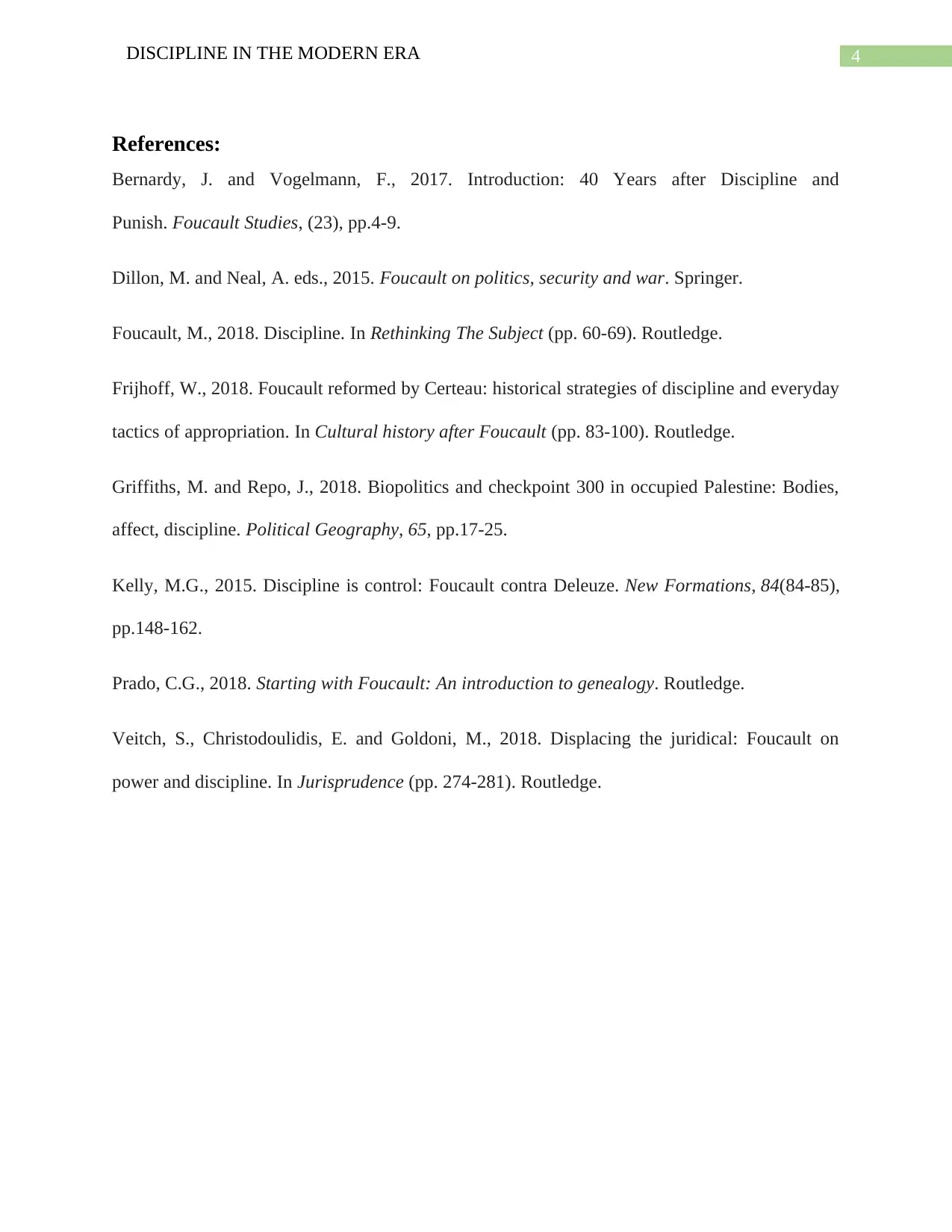
4DISCIPLINE IN THE MODERN ERA
References:
Bernardy, J. and Vogelmann, F., 2017. Introduction: 40 Years after Discipline and
Punish. Foucault Studies, (23), pp.4-9.
Dillon, M. and Neal, A. eds., 2015. Foucault on politics, security and war. Springer.
Foucault, M., 2018. Discipline. In Rethinking The Subject (pp. 60-69). Routledge.
Frijhoff, W., 2018. Foucault reformed by Certeau: historical strategies of discipline and everyday
tactics of appropriation. In Cultural history after Foucault (pp. 83-100). Routledge.
Griffiths, M. and Repo, J., 2018. Biopolitics and checkpoint 300 in occupied Palestine: Bodies,
affect, discipline. Political Geography, 65, pp.17-25.
Kelly, M.G., 2015. Discipline is control: Foucault contra Deleuze. New Formations, 84(84-85),
pp.148-162.
Prado, C.G., 2018. Starting with Foucault: An introduction to genealogy. Routledge.
Veitch, S., Christodoulidis, E. and Goldoni, M., 2018. Displacing the juridical: Foucault on
power and discipline. In Jurisprudence (pp. 274-281). Routledge.
References:
Bernardy, J. and Vogelmann, F., 2017. Introduction: 40 Years after Discipline and
Punish. Foucault Studies, (23), pp.4-9.
Dillon, M. and Neal, A. eds., 2015. Foucault on politics, security and war. Springer.
Foucault, M., 2018. Discipline. In Rethinking The Subject (pp. 60-69). Routledge.
Frijhoff, W., 2018. Foucault reformed by Certeau: historical strategies of discipline and everyday
tactics of appropriation. In Cultural history after Foucault (pp. 83-100). Routledge.
Griffiths, M. and Repo, J., 2018. Biopolitics and checkpoint 300 in occupied Palestine: Bodies,
affect, discipline. Political Geography, 65, pp.17-25.
Kelly, M.G., 2015. Discipline is control: Foucault contra Deleuze. New Formations, 84(84-85),
pp.148-162.
Prado, C.G., 2018. Starting with Foucault: An introduction to genealogy. Routledge.
Veitch, S., Christodoulidis, E. and Goldoni, M., 2018. Displacing the juridical: Foucault on
power and discipline. In Jurisprudence (pp. 274-281). Routledge.
1 out of 5
Your All-in-One AI-Powered Toolkit for Academic Success.
+13062052269
info@desklib.com
Available 24*7 on WhatsApp / Email
![[object Object]](/_next/static/media/star-bottom.7253800d.svg)
Unlock your academic potential
Copyright © 2020–2026 A2Z Services. All Rights Reserved. Developed and managed by ZUCOL.


